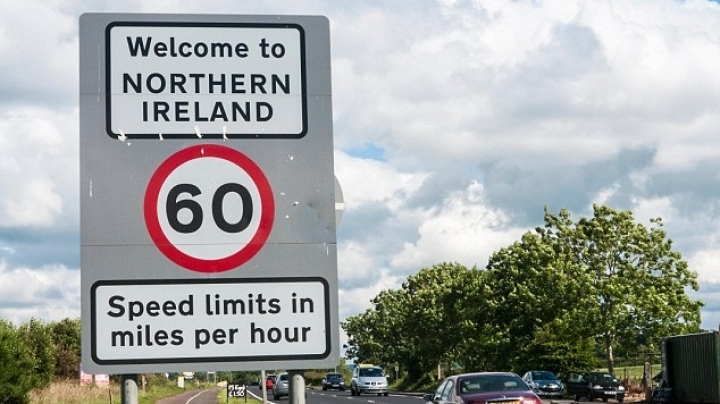#Brexit: Sinn Fein calls for a referendum on Irish reunification after Brexit

Irish republicans are calling for the reunification of Ireland after Britain voted to leave the European Union.
The UK's decision means that a new era of border controls are likely to emerge between the two countries, despite Northern Ireland voting Remain by 56 per cent.
Northern Ireland has the only land frontier between the United Kingdom and the rest of the EU.
It was marked by military checkpoints until a 1998 peace deal ended three decades of sectarian violence.
Within minutes of the referendum outcome becoming apparent, Northern Ireland's largest Irish nationalist party, Sinn Fein, said the result intensified the case for a vote on whether Northern Ireland should leave the United Kingdom.
Martin McGuinness, the Sinn Fein leader, believes Irish people should be given a chance to vote on their future, saying there was a 'democratic imperative' to allow people to vote on reunification.
He said: 'If Britain votes to leave the European Union then that could have huge implications for the entire island of Ireland and, given all the predictions, would run counter to the democratic wishes of the Irish people.'
Sinn Fein chairman Declan Kearney said in a statement: 'This outcome tonight dramatically changes the political landscape here in the north of Ireland and we will be intensifying our case for the calling of a border poll.
Britain's Secretary of State for Northern Ireland may call such a vote at any time, according to the 1998 agreement that brought about peace.
It also specifies that the Secretary 'shall' order a referendum if it appears likely that a majority of those voting would seek to form part of a united Ireland.
Nigel Dodds, a senior member of the province's largest party, the pro-British Democratic Unionist Party, said that Sinn Fein were on very weak ground calling for a unity vote.
Ireland's Foreign Minister Charlie Flanagan said the reintroduction of a hard border would have to be considered in any negotiation and that the return of controls, for customs or security, could pose a difficult challenge for the peace process.
The dismantling of military border posts was a key aspect of a 1998 peace deal that ended three decades of violence, which took the lives of 3,600 people, between Catholic nationalists seeking a united Ireland and Protestant unionists who wanted to keep Northern Ireland British.
British finance minister George Osborne has said border controls would be inevitable, while former prime ministers Tony Blair and John Major, who also campaigned for a vote to Remain, said a Brexit could undermine peace in the six-county province.
Pro-Brexit campaigners, including Britain's minister for Northern Ireland, described those warnings as 'scaremongering' and said a Brexit would not endanger a common travel area that predates both countries' entry into the EU in 1973.
The presidents of the European Commission, Council and Parliament are to hold a joint press conference in Brussels to set out their initial response to the demand for Brexit.
And ministers in the Irish government were called to a special meeting to reflect on the result ahead of a statement by Taoiseach Enda Kenny.
Ireland is bracing itself for damaging economic and political fallout from the decision today, as the UK is its largest trading partner with imports and exports worth around £1billion each week.
The Republic has the EU's fastest-growing economy but also more to lose than any other member state from a 'Brexit' with far-reaching implications for its trade, economy, security of energy supplies and peace in British-ruled Northern Ireland.
Ireland's central bank had warned that a withdrawal would hurt economic growth and jobs and significantly impact the financial sector, while a government-commissioned report found it could cut trade with Britain by at least 20 per cent.
Services firm Noonan said earlier this week that an estimated cumulative Brexit-related hit on the Irish economy of as much as 1.6 percent of GDP would be 'containable'.
Irish exporters will be the first to suffer, as the pound weakened significantly against the euro, making their euro-priced goods more expensive.
Foreign Minister Flanagan said the country will have to consider taking steps to assist firms exporting into Britain.
Farmers and food producers, major UK suppliers, are especially vulnerable.
The Farmers Journal has said 50 per cent of Ireland’s total beef exports goes to the UK, followed by one third of the country's total dairy exports.
With the UK leaving the EU, a drop in Irish exports of between £119m to £640m are to be expected.
The British Irish Chamber of Commerce said business needed a comprehensive and quickly concluded trade agreement between the EU and the UK that recognised the unique relationship between Ireland and the UK.
But the Republic could potentially try to benefit from Brexit, as some financial firms in the City of London may see Ireland as a lucrative option - an EU country, which is English-speaking and a close ally to the U.S.
- #Brexit: The polls finally open for Britain's historic Referendum vote
- #Brexit. German car makers warn an 'out' vote will put Britain at risk
- The day world changed: Britain WILL leave EU after voters trigger a political earthquake
- EU referendum results live: Brexit wins as Britain votes to leave European Union
- #Brexit: David Cameron RESIGNS as UK shocks world by voting for Brexit
- #BREXIT: Brexit sparks calls for other EU votes